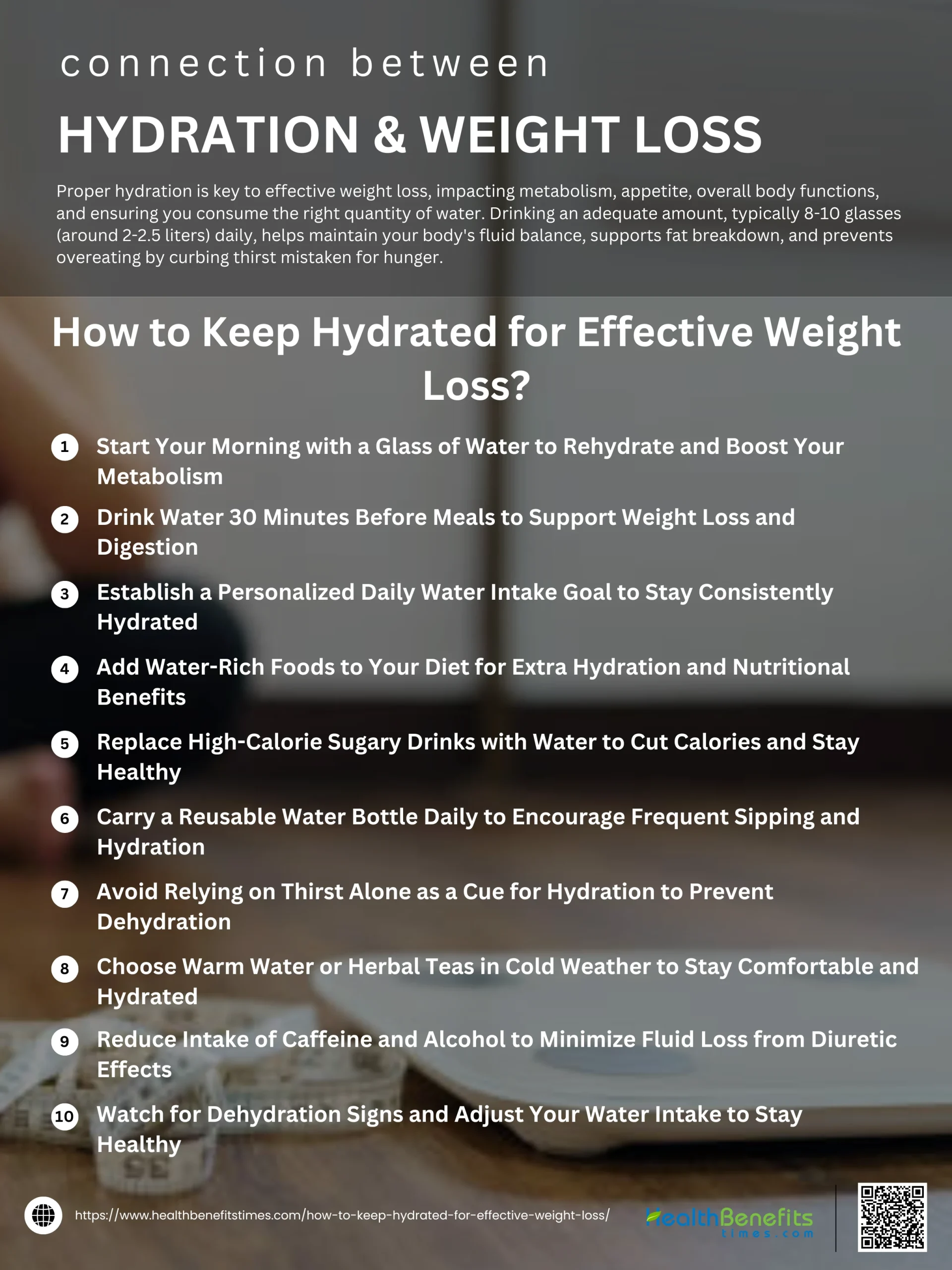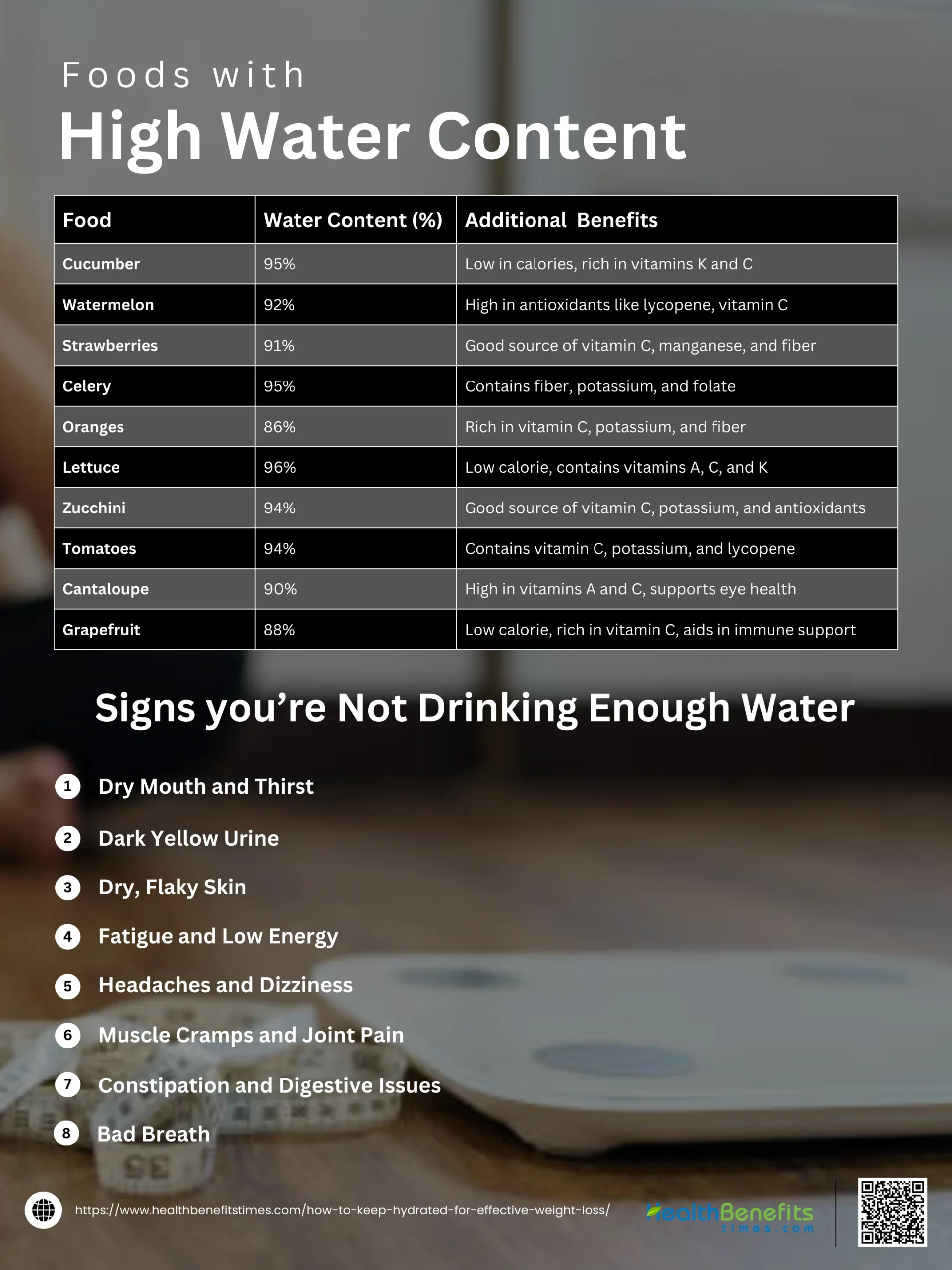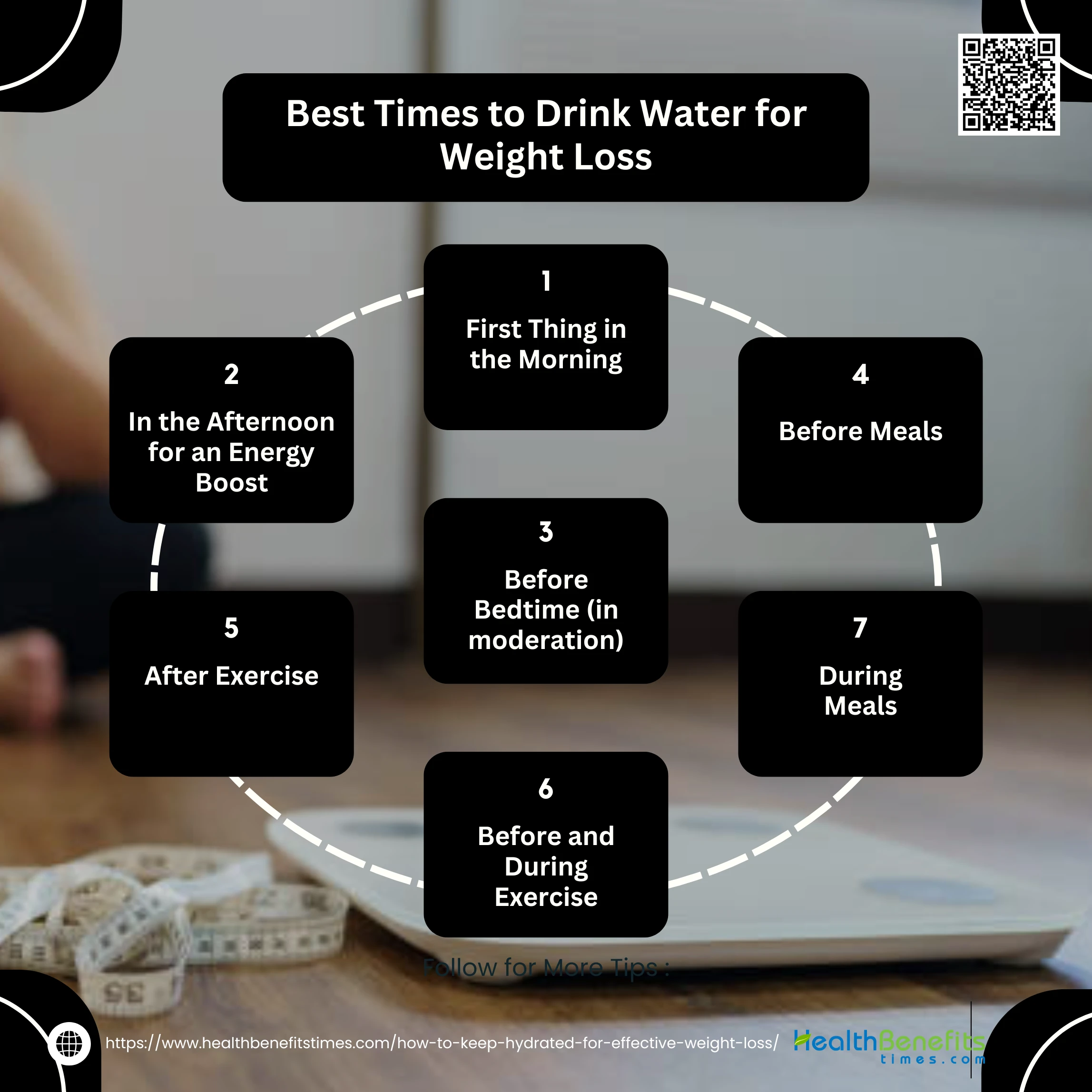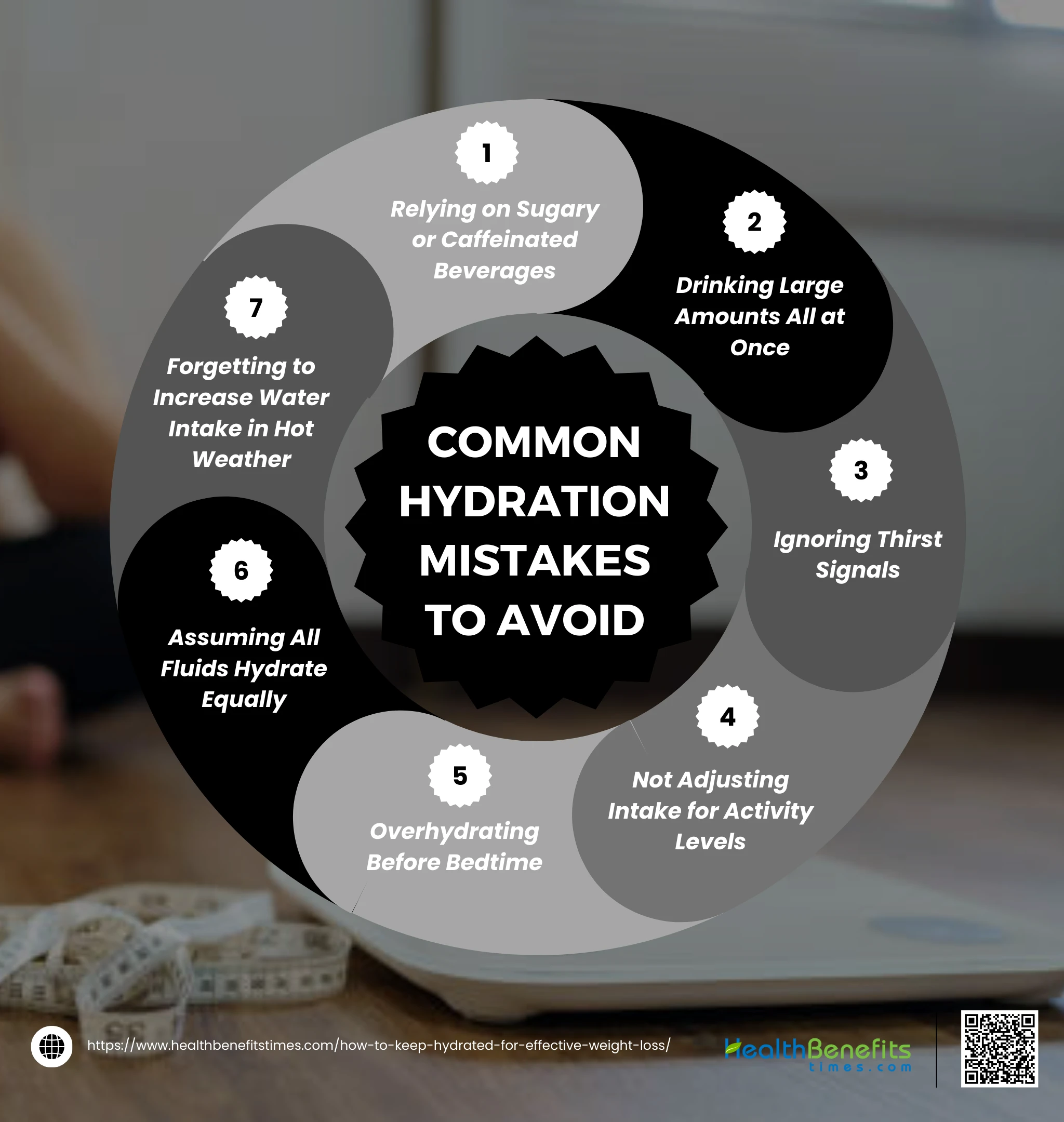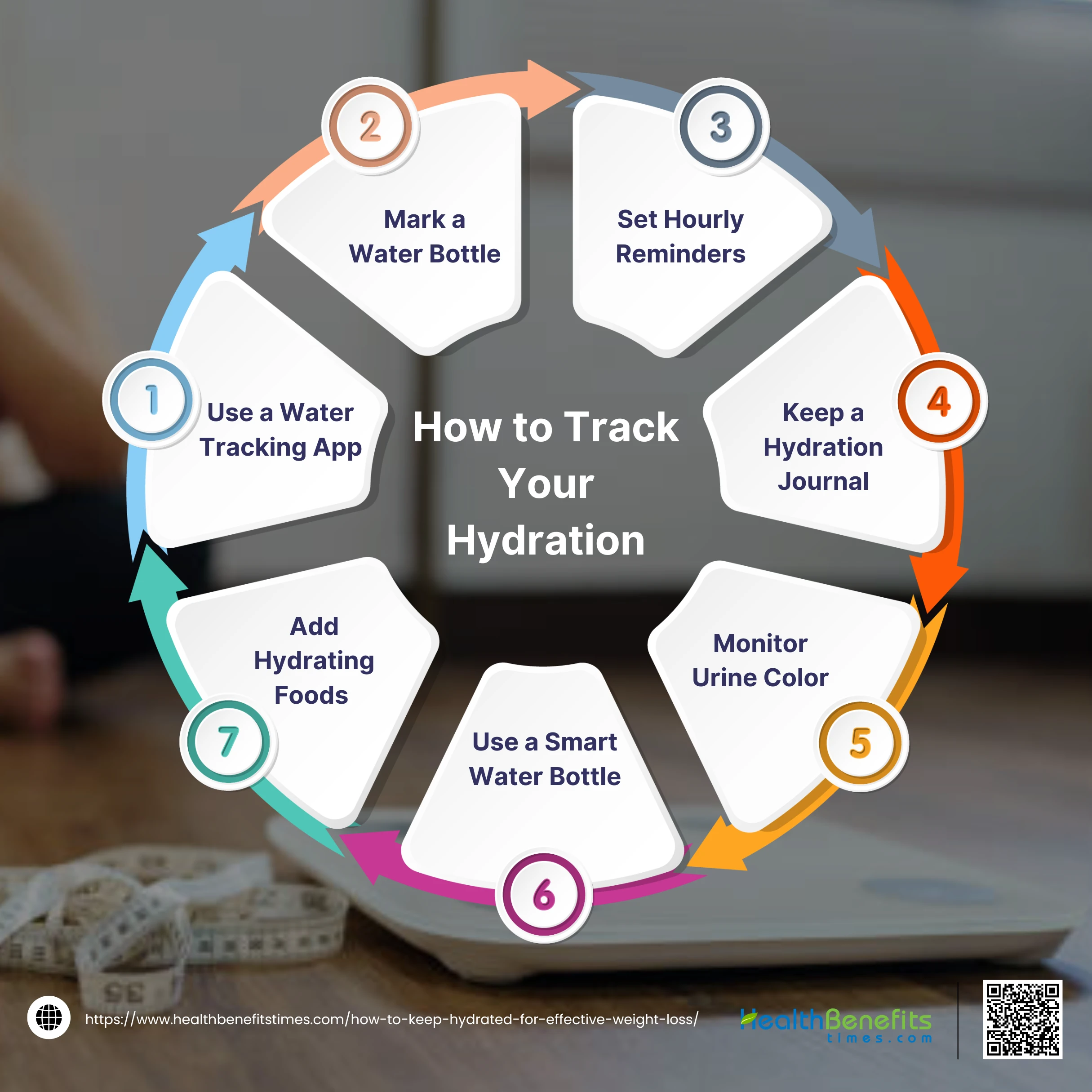- To stay hydrated for effective weight loss, start your day with water, drink before meals, and aim for a personalized water intake goal.
- Incorporate water-rich foods, replace sugary drinks, and carry a reusable bottle to encourage regular sipping.
- Limit caffeine and alcohol, and watch for dehydration signs to maintain optimal hydration.
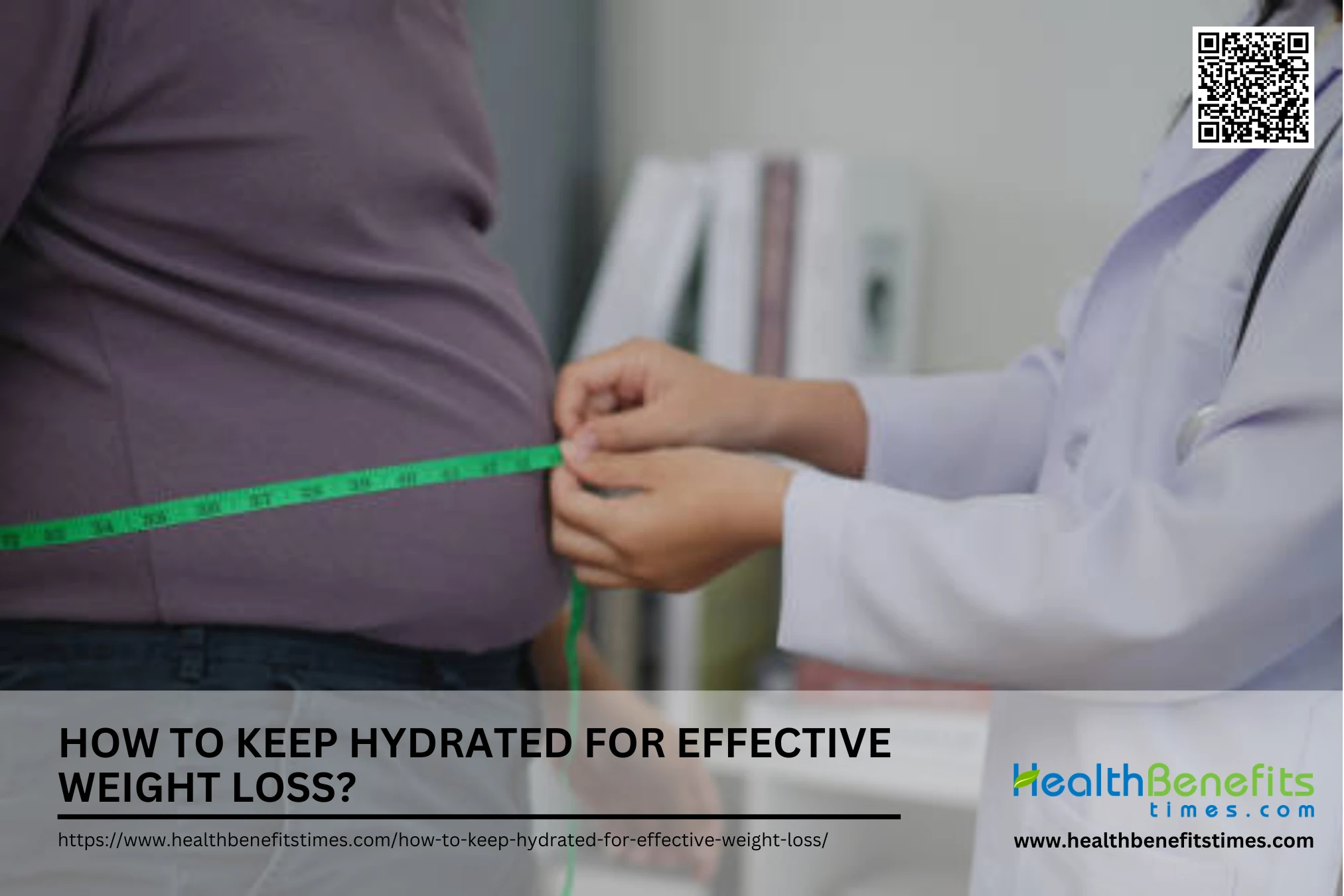 Staying hydrated is one of the most impactful yet often overlooked strategies for effective weight loss. Drinking enough water can play a imp. role in controlling appetite, boosting metabolism, supporting digestion, and enhancing exercise performance all factors that aid in managing and losing weight. When you’re hydrated, your body can distinguish between hunger and thirst more accurately, reducing unnecessary snacking and calorie intake. Here are detailed strategies to help you maintain optimal hydration during Weight Loss:
Staying hydrated is one of the most impactful yet often overlooked strategies for effective weight loss. Drinking enough water can play a imp. role in controlling appetite, boosting metabolism, supporting digestion, and enhancing exercise performance all factors that aid in managing and losing weight. When you’re hydrated, your body can distinguish between hunger and thirst more accurately, reducing unnecessary snacking and calorie intake. Here are detailed strategies to help you maintain optimal hydration during Weight Loss:
1. Start Your Day with Water
Begin each morning by drinking a glass of water to rehydrate after hours of sleep. This practice kickstarts your metabolism and prepares your digestive system for the day ahead. Adding a slice of lemon can enhance flavor and provide a dose of vitamin C, which supports immune function.
2. Drink Before Meals
Consuming a glass of water about 30 minutes before meals can act as a natural appetite suppressant. This habit helps create a sense of fullness, potentially leading to reduced calorie intake during meals. A study published in the journal Obesity found that participants who drank water before meals experienced greater weight loss compared to those who did not.
3. Set a Daily Water Goal
Establishing a daily water intake goal ensures consistent hydration. While individual needs vary, a common recommendation is to aim for at least 8–10 cups (2–2.5 liters) of water daily. Factors such as activity level, climate, and body weight can influence this requirement. Utilizing water tracking apps or marked water bottles can help monitor and achieve your hydration targets.
4. Incorporate Hydrating Foods
Enhance your hydration by including water-rich fruits and vegetables in your diet. Options like cucumbers, watermelon, oranges, and celery not only contribute to fluid intake but also provide essential nutrients and fiber. For instance, cucumbers are composed of about 96% water, making them an excellent hydrating snack.
5. Replace Sugary Drinks
Substituting sugary beverages with water, herbal teas, or naturally flavored water can significantly reduce calorie intake and prevent weight gain. Sugary drinks often contain empty calories that contribute to weight gain without providing nutritional benefits. Opting for water helps eliminate these unnecessary calories from your diet.
6. Carry Water with You
Keeping a reusable water bottle accessible throughout the day encourages regular sipping and helps maintain hydration levels. This practice is especially beneficial during busy schedules or when traveling, ensuring that you have a constant reminder to drink water.
7. Monitor Your Thirst
Relying solely on thirst as an indicator for hydration may not be sufficient, as the sensation of thirst often arises after dehydration has begun. Proactively drinking water at regular intervals, even when not feeling thirsty, helps maintain optimal hydration and supports bodily functions.
8. Opt for Warm Water in Cold Weather
In cooler climates or during colder seasons, drinking warm water or herbal teas can be a comforting way to stay hydrated. Warm beverages can encourage increased fluid intake and help maintain body temperature, promoting overall well-being.
9. Limit Diuretics
Be mindful of the consumption of diuretic substances such as caffeine and alcohol, as they can increase urine production and lead to fluid loss. Moderating intake of these beverages and compensating with additional water can help prevent dehydration and support weight loss efforts.
10. Listen to Your Body
Pay attention to signs of dehydration, including dark-colored urine, dry skin, fatigue, and dizziness. These indicators suggest the need for increased water intake. Regularly assessing your hydration status and responding appropriately ensures that your body functions optimally, aiding in weight loss and overall health.
By implementing these strategies, you can maintain proper hydration, which is a fundamental component of a successful weight loss journey.
![]() How Much Water You Really Need Daily
How Much Water You Really Need Daily
Below is a helpful table to guide daily water intake recommendations based on these various factors.
| Category | Recommended Daily Water Intake |
| Adult Men | 3.7 liters (about 13 cups) |
| Adult Women | 2.7 liters (about 9 cups) |
| Pregnant Women | 3.0 liters (about 10 cups) |
| Breastfeeding Women | 3.8 liters (about 13 cups) |
| Children (4-8 years) | 1.2 liters (about 5 cups) |
| Children (9-13 years) | 1.6-2.1 liters (about 7-9 cups) |
| Teens (14-18 years) | 2.3-3.3 liters (about 8-11 cups) |
| Active Individuals | 500-1,000 mL additional per hour of exercise |
| Hot/Arid Climate | Additional 500-1,000 mL per day |
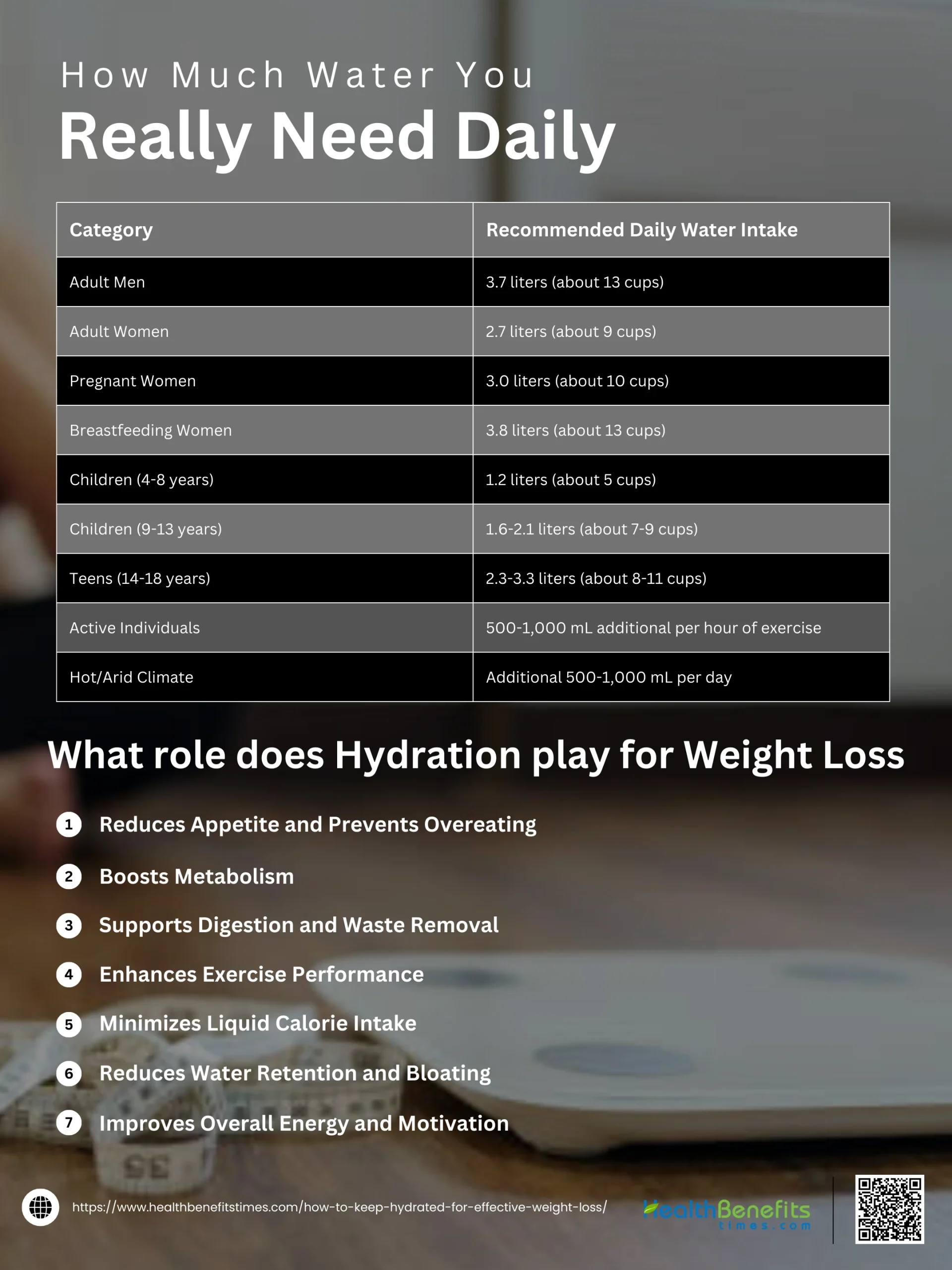 What role does Hydration play for Weight Loss
What role does Hydration play for Weight Loss
Hydration plays a fundamental role in weight loss and overall health, often acting as an unsung hero in any effective weight management strategy. Here’s a closer look at why staying hydrated is crucial for your weight loss journey:
- Reduces Appetite and Prevents Overeating
Thirst is frequently mistaken for hunger, leading to unnecessary snacking. Drinking water before meals can fill your stomach, helping you feel full sooner and reducing calorie intake. - Boosts Metabolism
Drinking water, especially cold water, can temporarily increase your metabolic rate. Your body burns extra calories warming cold water to body temperature, a process known as thermogenesis. - Supports Digestion and Waste Removal
Water aids in digestion and the elimination of waste, which prevents bloating and helps the body feel lighter. Proper hydration also ensures that nutrients are absorbed more efficiently, supporting a balanced metabolism. - Enhances Exercise Performance
Staying hydrated keeps muscles and joints functioning properly during exercise, reducing the risk of cramps and fatigue. Hydration enables longer, more effective workouts, which is essential for burning calories and building lean muscle. - Minimizes Liquid Calorie Intake
Choosing water over sugary or calorie-rich beverages helps reduce overall caloric intake without sacrificing hydration, making it easier to maintain a calorie deficit for weight loss. - Reduces Water Retention and Bloating
Ironically, drinking more water actually helps reduce water retention. When adequately hydrated, your body is less likely to hold onto excess water, reducing bloating and puffiness. - Improves Overall Energy and Motivation
Dehydration can lead to fatigue and low energy levels, making it harder to stay active and committed to your weight loss goals. Staying hydrated keeps energy levels up, making it easier to stick with a healthy routine.
Signs you’re Not Drinking Enough Water
Not drinking enough water can have noticeable effects on your body, impacting everything from your energy levels to how your skin looks and feels. Dehydration disrupts bodily functions, causing symptoms that range from mild to severe, depending on how long you’ve been lacking fluids. Here are some common signs that you may not be drinking enough water:
- Dry Mouth and Thirst
Constant thirst or a dry, sticky mouth is often one of the first indicators that your body needs more fluids. - Dark Yellow Urine
Dark-colored urine is a common sign of dehydration; ideally, urine should be light yellow if you’re properly hydrated. - Dry, Flaky Skin
Dehydration affects the skin, making it appear dull, dry, and sometimes even more prone to wrinkles. - Fatigue and Low Energy
Water is essential for energy production, so low fluid levels can leave you feeling unusually tired and sluggish. - Headaches and Dizziness
Dehydration can reduce blood flow to the brain, leading to headaches, dizziness, and difficulty concentrating. - Muscle Cramps and Joint Pain
Water helps cushion joints and muscles; dehydration can cause cramps and joint discomfort, especially during exercise. - Constipation and Digestive Issues
Inadequate hydration makes it harder for food to pass smoothly through the digestive system, often leading to constipation. - Bad Breath
A dry mouth can result in bacteria buildup, causing unpleasant breath—a less obvious but common sign of dehydration.
![]() Foods with High Water Content
Foods with High Water Content
Now we have good news for those who does not like to drink more water, for them eating foods with high water content can be an effective way to stay hydrated. Many fruits and vegetables are naturally rich in water, making them excellent choices for boosting your daily hydration while adding vitamins, minerals, and fiber to your diet. Below is a table of some common foods with high water content.
| Food | Water Content (%) | Additional Benefits |
| Cucumber | 95% | Low in calories, rich in vitamins K and C |
| Watermelon | 92% | High in antioxidants like lycopene, vitamin C |
| Strawberries | 91% | Good source of vitamin C, manganese, and fiber |
| Celery | 95% | Contains fiber, potassium, and folate |
| Oranges | 86% | Rich in vitamin C, potassium, and fiber |
| Lettuce | 96% | Low calorie, contains vitamins A, C, and K |
| Zucchini | 94% | Good source of vitamin C, potassium, and antioxidants |
| Tomatoes | 94% | Contains vitamin C, potassium, and lycopene |
| Cantaloupe | 90% | High in vitamins A and C, supports eye health |
| Grapefruit | 88% | Low calorie, rich in vitamin C, aids in immune support |
Best Times to Drink Water for Weight Loss
Drinking water strategically throughout the day can make a noticeable difference in supporting your weight loss efforts. Timing your water intake helps manage appetite, boost metabolism, and optimize your workout performance. Knowing the best times to drink water can enhance its effectiveness in promoting healthy weight loss.
- First Thing in the Morning
Start your day with a glass of water to rehydrate after a night’s sleep, kick-start your metabolism, and set a healthy tone for the day. - Before Meals
Drinking water about 30 minutes before a meal can help you feel fuller, reducing the likelihood of overeating and aiding portion control. - During Meals
Sipping water while eating can aid digestion, prevent overeating, and help you pace your meal, which is beneficial for mindful eating. - Before and During Exercise
Hydrating before and during workouts supports muscle function, reduces fatigue, and helps you sustain energy levels, allowing for more effective calorie-burning sessions. - After Exercise
Drink water after exercising to replace fluids lost through sweat, promote muscle recovery, and prevent dehydration. - In the Afternoon for an Energy Boost
Instead of reaching for caffeine, drink a glass of water in the afternoon to help combat fatigue, stay focused, and avoid unnecessary snacking. - Before Bedtime (in moderation)
A small glass of water before bed can prevent dehydration overnight, but avoid excessive intake to minimize sleep disruptions.
Common Hydration Mistakes to Avoid
Maintaining proper hydration is essential, but it’s easy to make mistakes that can hinder your hydration goals. Common errors, like relying on sugary drinks or ignoring your body’s thirst signals, can lead to dehydration and negatively impact your health and weight loss efforts. Here are some common hydration mistakes to avoid to ensure you’re getting the most out of your water intake.
- Relying on Sugary or Caffeinated Beverages
Sugary drinks and caffeinated beverages don’t hydrate as effectively as water and can even contribute to dehydration. Opt for water, herbal teas, or other low-calorie drinks instead. - Drinking Large Amounts All at Once
Chugging large amounts of water quickly can lead to discomfort and may not hydrate as effectively. It’s better to sip water consistently throughout the day. - Ignoring Thirst Signals
Thirst is your body’s natural reminder to drink, so don’t ignore it. Delaying hydration can lead to mild dehydration, affecting your energy and focus. - Not Adjusting Intake for Activity Levels
Physical activity increases your body’s need for water. Failing to drink more water when active can lead to dehydration and hinder workout performance. - Overhydrating Before Bedtime
Drinking too much water before bed can disrupt your sleep with frequent trips to the bathroom. Instead, try to stay hydrated consistently throughout the day. - Assuming All Fluids Hydrate Equally
Not all fluids are equally hydrating; alcohol, caffeinated drinks, and sugary sodas can actually increase dehydration. Stick primarily to water and other hydrating options. - Forgetting to Increase Water Intake in Hot Weather
Hot and humid weather increases fluid loss through sweat, so it’s essential to drink extra water in warmer climates to stay properly hydrated.
How to Track Your Hydration
Keeping track of your hydration can help ensure you’re consistently meeting your body’s water needs, especially when busy schedules or lifestyle changes make it easy to overlook. Monitoring your water intake not only helps maintain energy levels but also supports digestion, weight management, and overall health. Here are some simple and effective ways to track your hydration.
- Use a Water Tracking App
Many apps are available that allow you to log your daily water intake, set reminders, and even track your progress over time to help you stay accountable. - Mark a Water Bottle
Use a large water bottle and mark it with time-based goals to help you pace your intake throughout the day and visually track your progress. - Set Hourly Reminders
Setting hourly reminders on your phone can prompt you to take a few sips regularly, preventing you from going too long without drinking water. - Keep a Hydration Journal
Logging your water intake in a journal helps you see patterns in your hydration habits and adjust your intake accordingly. - Monitor Urine Color
A quick way to gauge hydration is by observing urine color. Light yellow indicates good hydration, while darker shades suggest you may need more water. - Use a Smart Water Bottle
Smart water bottles track your intake automatically and can sync with your phone to remind you to drink, making it easy to stay on top of your hydration. - Add Hydrating Foods to Your Diet
Tracking hydrating foods like fruits and vegetables can contribute to your daily intake and help you reach your hydration goals naturally.
Conclusion
Staying properly hydrated is a simple yet powerful way to support your overall health and weight loss journey. By drinking enough water and incorporating hydrating foods into your diet, you enable your body to function optimally, from regulating metabolism to improving digestion and enhancing exercise performance. Avoiding common hydration mistakes, tracking your water intake, and timing your hydration around key points in the day can make it easier to meet your daily needs. Remember, hydration is not just about quenching thirst—it’s an essential component of your wellness routine that impacts nearly every aspect of your body. Prioritizing hydration will help you feel more energetic, focused, and resilient on your path to better health.
FAQs
- Can herbal teas or infused water count toward my daily water intake?
Yes, herbal teas and naturally infused waters (without added sugars) are excellent options to supplement your water intake. They offer hydration benefits while providing subtle flavors that can make drinking water more enjoyable. - Does the amount of water I need change as I age?
Yes, as we age, our body’s water content naturally decreases, and thirst cues may become less pronounced. Older adults may need to pay closer attention to hydration, as they may not feel thirsty as readily as when they were younger. - Are there specific times when drinking water is not recommended?
Drinking large amounts of water right before bed is best avoided, as it can disrupt sleep by causing frequent bathroom trips. It’s also wise to avoid chugging water immediately before or after large meals, as this may dilute digestive enzymes and affect digestion. - How can I tell if I am overhydrated?
Signs of overhydration, or water intoxication, include symptoms like nausea, headache, bloating, confusion, and, in severe cases, seizures. Overhydration is rare but can occur when excessive amounts of water are consumed quickly without allowing the body to process it properly. - Is there a way to calculate my exact daily water needs?
A good rule of thumb is to drink half an ounce to one ounce of water per pound of body weight. For example, someone weighing 150 pounds might aim for 75–150 ounces of water daily, adjusting for factors like physical activity and climate. However, it’s best to consult with a healthcare provider for personalized advice.


